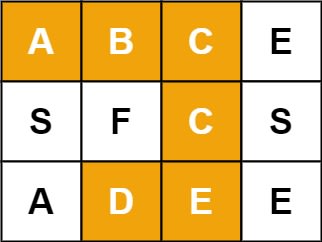Given an m x n grid of characters board and a string word, return true if word exists in the grid.
The word can be constructed from letters of sequentially adjacent cells, where adjacent cells are horizontally or vertically neighboring. The same letter cell may not be used more than once.
Example 1:
Input: board = [["A","B","C","E"],["S","F","C","S"],["A","D","E","E"]], word = "ABCCED"
Output: true
Example 2:
Input: board = [["A","B","C","E"],["S","F","C","S"],["A","D","E","E"]], word = "SEE"
Output: true
Example 3:
Input: board = [["A","B","C","E"],["S","F","C","S"],["A","D","E","E"]], word = "ABCB"
Output: false
Constraints:
-
m == board.length -
n = board[i].length -
1 <= m, n <= 6 -
1 <= word.length <= 15 -
boardandwordconsists of only lowercase and uppercase English letters.
Follow up: Could you use search pruning to make your solution faster with a larger board?
SOLUTION:
# class Solution:
# def isAdjacent(a, b, c, d):
# if a == c and abs(b - d) == 1:
# return True
# if b == d and abs(a - c) == 1:
# return True
# return False
# def exist(self, board: List[List[str]], word: str) -> bool:
# m = len(board)
# n = len(board[0])
# wlen = len(word)
# pos = [[] for c in word]
# for i in range(m):
# for j in range(n):
# for k in range(wlen):
# if word[k] == board[i][j]:
# pos[k].append((i, j))
# paths = [[i] for i in pos[0]]
# while len(paths) > 0:
# curr = paths.pop(0)
# currlen = len(curr)
# lastcell = curr[-1]
# if currlen == wlen:
# return True
# if currlen < wlen:
# for x, y in pos[currlen + 1]:
# if (x, y) not in curr and self.isAdjacent(lastcell, x, y):
# paths.append(curr + [(x, y)])
# return False
class Solution:
def getNeighbors(self, i, j, m, n):
nb = []
if i > 0:
nb.append((i - 1, j))
if i < m - 1:
nb.append((i + 1, j))
if j > 0:
nb.append((i, j - 1))
if j < n - 1:
nb.append((i, j + 1))
return nb
def isPossible(self, board, m, n, pos, word, i, used):
if i == len(word) - 1:
return True
neighbors = self.getNeighbors(pos[0], pos[1], m, n)
for a, b in neighbors:
if (a, b) not in used and board[a][b] == word[i + 1]:
if self.isPossible(board, m, n, (a, b), word, i + 1, used.union({(a, b)})):
return True
return False
def exist(self, board: List[List[str]], word: str) -> bool:
m = len(board)
n = len(board[0])
wlen = len(word)
for i in range(m):
for j in range(n):
if board[i][j] == word[0]:
if self.isPossible(board, m, n, (i, j), word, 0, {(i, j)}):
return True
return False





Top comments (0)